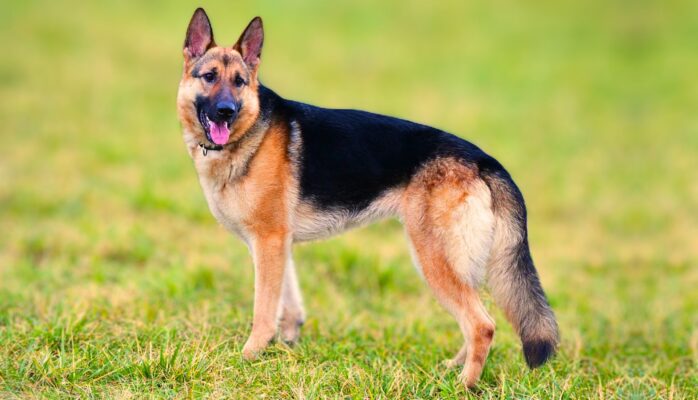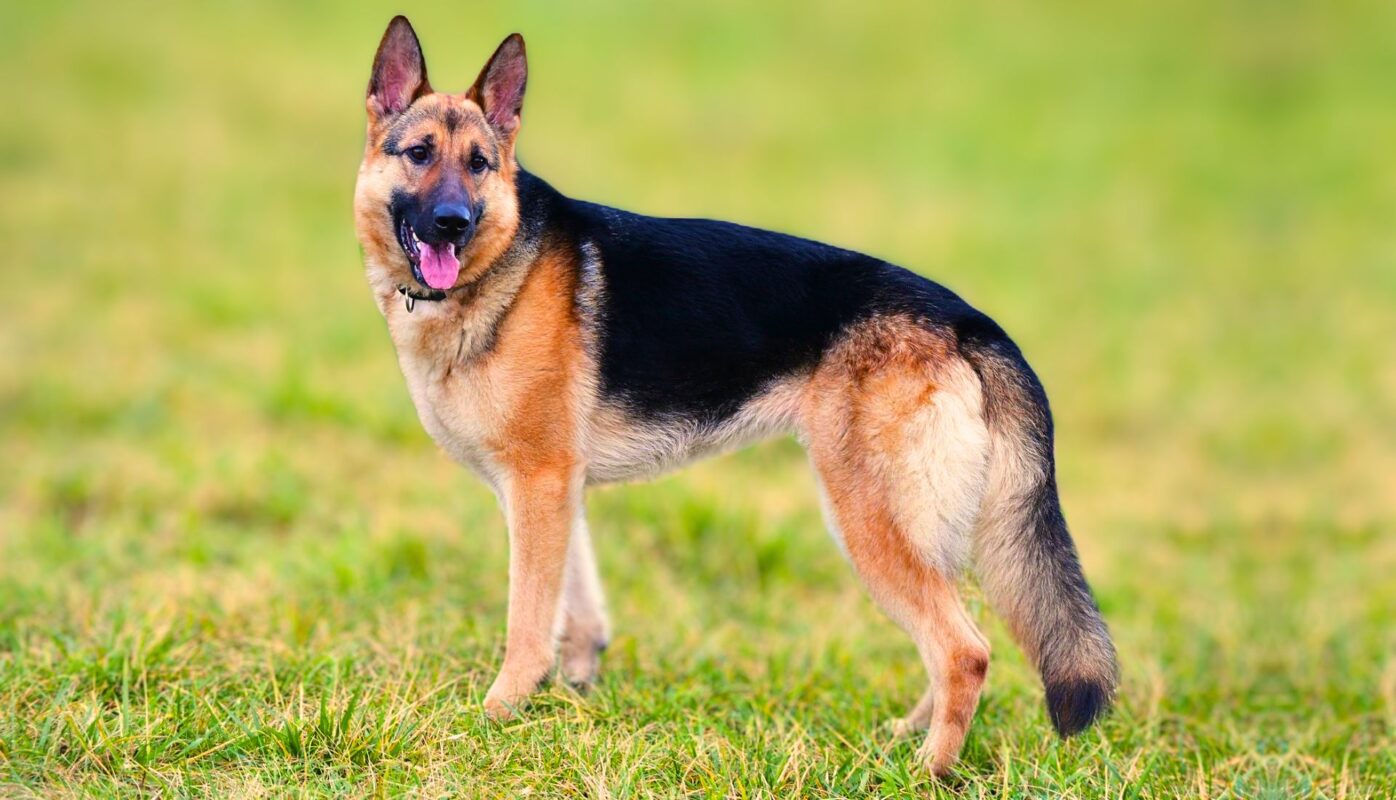German Shepherd – The Noble Guardian and Versatile Working Dog
German Shepherds are celebrated worldwide for their intelligence, loyalty, and adaptability. Renowned as both devoted family companions and highly capable working dogs, this breed has earned a reputation for excellence in police, military, search and rescue, and service roles. This comprehensive article will guide you through the rich history, distinctive physical features—including detailed information on size, weight, and life expectancy—temperament, care requirements, and the many roles German Shepherds fulfill in society.

1. History and Origins
The German Shepherd originated in Germany during the late 19th century when Captain Max von Stephanitz set out to develop the ideal herding dog. He carefully selected dogs that demonstrated intelligence, strength, and trainability. The result was a breed with impressive herding capabilities and a natural instinct for protection. German Shepherds soon gained international recognition for their versatility and work ethic, and they played critical roles during both World Wars in various military and police tasks.
Their service during wartime and in subsequent peacekeeping and security roles has cemented the German Shepherd’s reputation as a reliable and courageous working partner. Today, they continue to serve in many capacities, including search and rescue, therapy, and as loyal family companions.
2. Physical Characteristics, Size, and Lifespan
German Shepherds are medium-to-large dogs built for strength, agility, and endurance. Key physical attributes include:
- Head and Ears: They feature a noble, elongated head with a strong, defined jawline. Their upright, pointed ears enhance their alert appearance and contribute to their excellent hearing.
- Eyes: Almond-shaped and expressive, the eyes of a German Shepherd exude intelligence and determination.
- Coat: Their dense, double-layered coat protects them from various weather conditions. Common coat colors include black and tan, sable, and solid black. Regular grooming is necessary to manage shedding and maintain coat health.
- Body Structure: German Shepherds have a well-proportioned, muscular build that is both agile and robust. Their deep chest, strong legs, and sturdy frame enable them to perform demanding tasks.
Detailed Measurements:
- Height: Typically, German Shepherds stand between 22 to 26 inches (56 to 66 cm) tall at the shoulder, with males usually at the upper range.
- Weight: Their weight generally falls between 50 to 90 pounds (23 to 41 kg), depending on factors such as gender, genetics, and overall health.
- Life Expectancy: With proper care, German Shepherds can live between 9 to 13 years, though individual longevity may vary based on genetics, diet, and lifestyle.
These detailed physical traits are not only key to their striking appearance but also critical for their performance in various working roles.
3. Personality and Temperament
The German Shepherd’s balanced temperament is one of its most admired traits. Their personality features include:
- Loyal and Protective: Known for forming strong bonds with their families, German Shepherds are naturally protective and make excellent guardians.
- Intelligent and Trainable: Their high level of intelligence and eagerness to please make them exceptionally trainable. They quickly learn and execute complex commands, making them ideal for specialized roles.
- Courageous and Confident: Whether deployed in high-stress environments or as family pets, these dogs exhibit remarkable courage and self-assurance.
- Energetic and Active: Stemming from their working heritage, German Shepherds require regular physical and mental exercise to stay healthy and engaged.
- Reserved Yet Sociable: While they can be friendly with proper socialization, German Shepherds tend to be naturally cautious around strangers, emphasizing the importance of early exposure to varied environments.
Their balanced temperament makes them equally suited to rigorous working roles and life as a loving companion in a family setting.
4. Care and Training
4.1. Nutrition and Feeding
A balanced diet is essential for a German Shepherd’s health. High-quality dog food formulated for active, large-breed dogs will provide the necessary proteins, fats, vitamins, and minerals. It is important to adjust portion sizes based on the dog’s age, weight, and activity level. Regular consultations with a veterinarian can help tailor a feeding plan that prevents obesity while supporting the dog’s energy needs.
4.2. Exercise and Physical Activity
German Shepherds are energetic dogs that thrive on physical activity. Daily exercise is critical to maintain their muscle tone and mental stimulation. Recommended activities include:
- Daily Walks and Runs: At least one hour of brisk walking or jogging each day.
- Agility Training: Activities that challenge their agility and problem-solving skills.
- Interactive Play: Games like fetch or tug-of-war, which not only burn energy but also enhance bonding with the owner.
Adequate exercise not only keeps them physically fit but also helps in reducing behavioral issues that may arise from boredom or pent-up energy.
4.3. Training and Socialization
Training is key to nurturing a well-behaved German Shepherd. Early and consistent training using positive reinforcement—such as treats, praise, and play—ensures that they learn obedience and social etiquette effectively. Socialization is equally important, helping them become comfortable around other dogs, people, and various environments. Due to their intelligence, many German Shepherds excel in obedience competitions, agility trials, and specialized work like tracking and search and rescue missions.
5. Health Considerations
While German Shepherds are generally robust, they are susceptible to certain health issues. Awareness and preventive care are critical:
- Hip and Elbow Dysplasia: A genetic condition that affects joint development, leading to arthritis. Regular vet check-ups and maintaining a healthy weight can help manage this risk.
- Digestive Disorders: Some individuals may experience gastrointestinal issues, which can often be mitigated through a stable, balanced diet.
- Skin Conditions: Allergies or irritations may occur, especially in dogs with sensitive skin. Proper grooming and the use of hypoallergenic products can be beneficial.
- Cardiac Issues: Though less common, heart-related conditions can affect the breed. Routine screenings are advisable as the dog ages.
A proactive approach involving regular veterinary visits, a balanced diet, and consistent exercise routines is essential to ensuring your German Shepherd lives a long, healthy, and active life.
6. The Role of the German Shepherd in Society
German Shepherds are much more than household pets; they are true working partners. Their diverse roles include:
- Law Enforcement and Military Work: Their keen senses, agility, and trainability make them indispensable in police and military operations, including detection, tracking, and crowd control.
- Search and Rescue: Their endurance and determination have proven vital in rescuing people from disaster zones or challenging terrains.
- Service and Assistance: Many are trained as service dogs, providing physical and emotional support to individuals with disabilities.
- Family Companions: At home, their protective yet affectionate nature makes them reliable guardians and loving family members.
Their multifaceted roles in society highlight the breed’s adaptability, intelligence, and unwavering commitment to duty.
7. Conclusion
The German Shepherd is a testament to the results of careful breeding, rigorous training, and a deep-rooted work ethic. With a storied history as a herding and guarding dog, this breed’s impressive physical capabilities—detailed in height, weight, and life expectancy—combined with a balanced and protective temperament, make them an exceptional choice for both work and family life.
For anyone considering a German Shepherd, the promise is a dog that is not only intelligent and courageous but also deeply loyal and affectionate. With proper care, nutrition, exercise, and training, this noble breed thrives in various roles, bringing security, joy, and companionship to every home.


